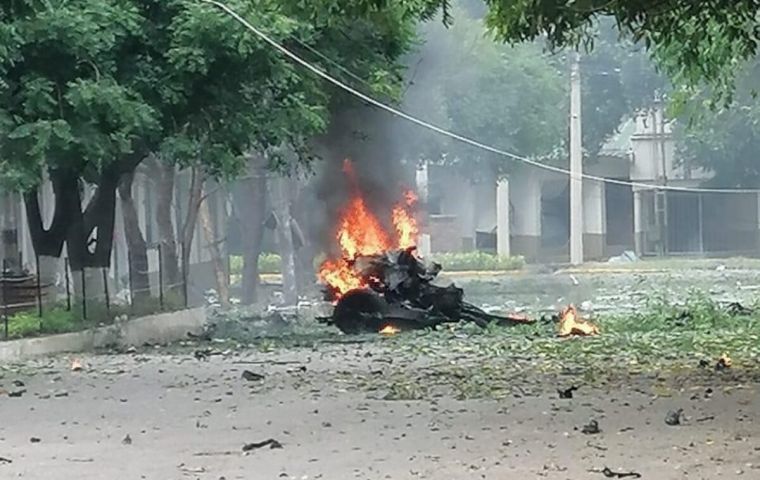MercoPress. South Atlantic News Agency
Explosion shocks Colombian Army post, opposition CNP halts demonstrations to advance dialogue
 Ten military staff were said to have been wounded and taken to local health care centres for treatment.
Ten military staff were said to have been wounded and taken to local health care centres for treatment. Colombian President Iván Duque Tuesday ordered Defense Minister Diego Molano today to open up an investigation into the explosion of a vehicle at Army facilities in Cúcuta, it was reported.
The explosion took place at 3.30 pm inside the local San Jorge barracks where a white vehicle parked at the site detonated at least twice.
There were no reports on deaths, but ten military staff were said to have been wounded and taken to local health care centres for treatment.
Meanwhile, the National Strike Committee has announced new fight strategies in their campaign against Duque's policies, according to Francisco Maltés, president of the Central Unitaria de Los Trabajadores (CUT).
The National Centre of Productivity (CNP) new fighting strategies have to do with preventing violence and killings due to repression against protesters, and in that regard, this Wednesday's demonstrations have been called off, although a big event was proposed to mark the first anniversary of the Emergency Statement to the National Government.
In the meantime, opposition leaders hope progress will be achieved through dialogue with the participation of unions, citizens and universities, among others. “Social mobilization will continue in Colombia, more mobilizations will come later. At this time and this juncture we will have the great concert, one year after presenting the emergency document,” Maltés said.
A large sit-in is planned before Congress to support petitions for reforms in health, taxation and public education, among other issues.
The CNP will continue to call for the repeal of several decrees of the Duque government, such as the one that extended military assistance in several places where massive demonstrations took place since the start of the strike. Repression against protesters has left more than 70 dead, according to the NGO Temblores, dozens injured, more than 3,000 police abuses, and dozens missing.
“Making a temporary interruption of the recurring mobilizations that we had been doing on Wednesdays, that does not mean that the mobilization stops in Colombia,” Maltés also explained.
Other requests submitted before the Duque government were solutions to face the social and economic crisis, mass vaccination and a basic income equivalent to a minimum wage for 7.5 million people for one year in addition to the defence of both agricultural and industrial production in the country, subsidies to small and medium-sized companies, and financial support for university students, among other requests.
Negotiations have been stalled since the Duque government demands that the CNP firsts lift the road blockades it has set up particularly near Cali. “The government reiterates that all the blockades must be definitively ended,” said Emilio Archila, presidential adviser for Stabilization and Consolidation, and official spokesman for the Iván Duque administration in the negotiations with the CNP.
Archila also insisted that the government is willing to dialogue with the CNP, and that “all the other spaces” for conversation “with all the other representatives” of society will continue since the CNP “does not represent the entire population that has protested.” He added that ”blockades are not a form of peaceful protest.”




Top Comments
Disclaimer & comment rulesCommenting for this story is now closed.
If you have a Facebook account, become a fan and comment on our Facebook Page!